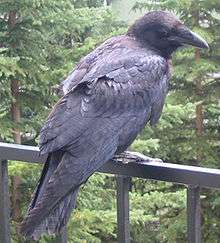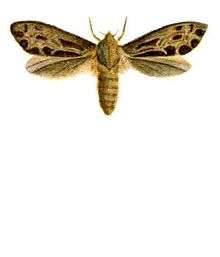Definify.com
Definition 2026
corbie
corbie
English

A corbie (raven)

A corbie (Oncopera intricata)
Alternative forms
- corby
Noun
corbie (plural corbies)
- A raven or crow.
- 1825, Basil Hall, journal entry quoted in 1837, Walter Scott, J. G. Lockhart (editor), Memoirs of the Life of Sir Walter Scott, Bart., in The Complete Works of Sir Walter Scott, Volume 7, page 417,
- From parrots we got to corbies, or ravens, and he told us with infinite humour a story of a certain tame bird of this description, whose constant delight was to do mischief, and to plague all mankind and beastkind.
- 1899, John Buchan, The Moor-song, Grey Weather, page 133,
- And with them were some lang-gowned men who kenned the stars and would come out o' nights to talk to the deer and the corbies in their ain tongue.
- 1963, John Harrington Cox (editor), 6: The Three Ravens (Child, No. 26), Folk-Songs of the South, page 31,
- In the "Twa Corbies" of Child it is the knight that is slain and one corbie is to sit on his "hause-bane" and the other is to pick out his eyes. In the West Virginia variants it is the horse that is slain, whose eyes the crows are going to pluck out.
- 1825, Basil Hall, journal entry quoted in 1837, Walter Scott, J. G. Lockhart (editor), Memoirs of the Life of Sir Walter Scott, Bart., in The Complete Works of Sir Walter Scott, Volume 7, page 417,
- Either of two moth species of genus Oncopera, whose larvae feed on grasses, especially Oncopera intricata.
- 2007, J. B. Kirkpatrick, Chapter 5: Sheep and nature on the run country, Jamie Kirkpatrick, Kerry Bridle (editors), People, Sheep and Nature Conservation: The Tasmanian Experience, page 158,
- The eastern quoll (Dasyurus viverrinus), a species believed to be extinct on mainland Australia, is common in the run and front country, where it consumes corbie grubs and cockchafers, among slightly larger prey and carrion.
- 2007, J. B. Kirkpatrick, Chapter 5: Sheep and nature on the run country, Jamie Kirkpatrick, Kerry Bridle (editors), People, Sheep and Nature Conservation: The Tasmanian Experience, page 158,
Derived terms
- corbie gable
- corbiestep
- winter corbie (Oncopera rufobrunnea)
Related terms
Scots
Etymology
From Old French corbe, from Latin corvus.
Pronunciation
- IPA(key): /ˈkɔrbɪ/, /ˈkorbi/
Noun
corbie (plural corbies)
- raven; (sometimes also) carrion crow, rook
- 1817, Walter Scott, Rob Roy, II.1:
- The priests and the Irish officers, and thae papist cattle that hae been sodgering abroad, because they durstna bide at hame, are a' fleeing thick in Northumberland e'enow; and thae corbies dinna gather without they smell carrion.
- 1817, Walter Scott, Rob Roy, II.1: